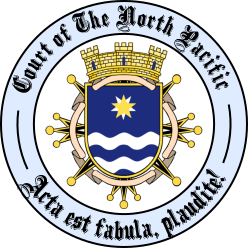Enjoy:
Ruling of the Court of The North Pacific
In regards to the Judicial Inquiry filed by TlomzKrano on 'On the Time at Which Oaths Become Binding'
Opinion drafted by Justice Eluvatar, joined by Chief Justice Attempted Socialism and Justice Pallaith
The Court took into consideration the inquiry filed
here by TlomzKrano
The Court took into consideration the relevant portion of the Constitution of The North Pacific.
Article 3: The Delegate and Vice Delegate
13. The Delegate and Vice Delegate will be elected by the Regional Assembly every four months. No person shall be elected Delegate to a full or partial term in three consecutive election cycles.
The Court took into consideration the prior rulings by the Court
On the Time at Which Oaths Become Binding,
On Oath Violations by Former Members of the Regional Assembly,
On Recognizing Outdated Rulings, and
On Defunct Rulings
The Court opines the following:
On Standing
The petitioner is the Court Examiner, and enjoys universal standing for all questions before this Court. There is no question of proper standing in this case.
On the Court’s Prior Ruling
This Court is asked to reconsider one of its prior rulings in light of a change that was made to the legal code since that opinion was delivered. That ruling,
On the Time at Which Oaths Become Binding, was concerned with defining the scope of application of the citizenship oath in time (when is one bound by it?). In applying the Court's test as outlined in
On Defunct Rulings, we conclude that the Court's ruling was correct at the time. It is consistent with current law in all respects but the timing of automatic citizenship: at the time, 14 days without rejection meant automatic admission to citizenship. Today, the law requires applications to be processed within 7 days. As the ruling explicitly references 14 days, that part of the ruling is defunct.
Holding
As the case was properly decided and the Court's consideration of the time when the citizenship oath is binding, including its application of
On Oath Violations by Former Members of the Regional Assembly, is consistent with existing Constitutional and legal language and affirmed again by this decision,
we find that only a narrow portion of our prior ruling On the Time at Which Oaths Become Binding, concerning the application of the oath after 14 days without acceptance or rejection, is now defunct as precedent. Therefore, that portion of the ruling ("14 days") will be modified with strikethrough tags, acknowledging its obsolescence while preserving it for historical purposes.

